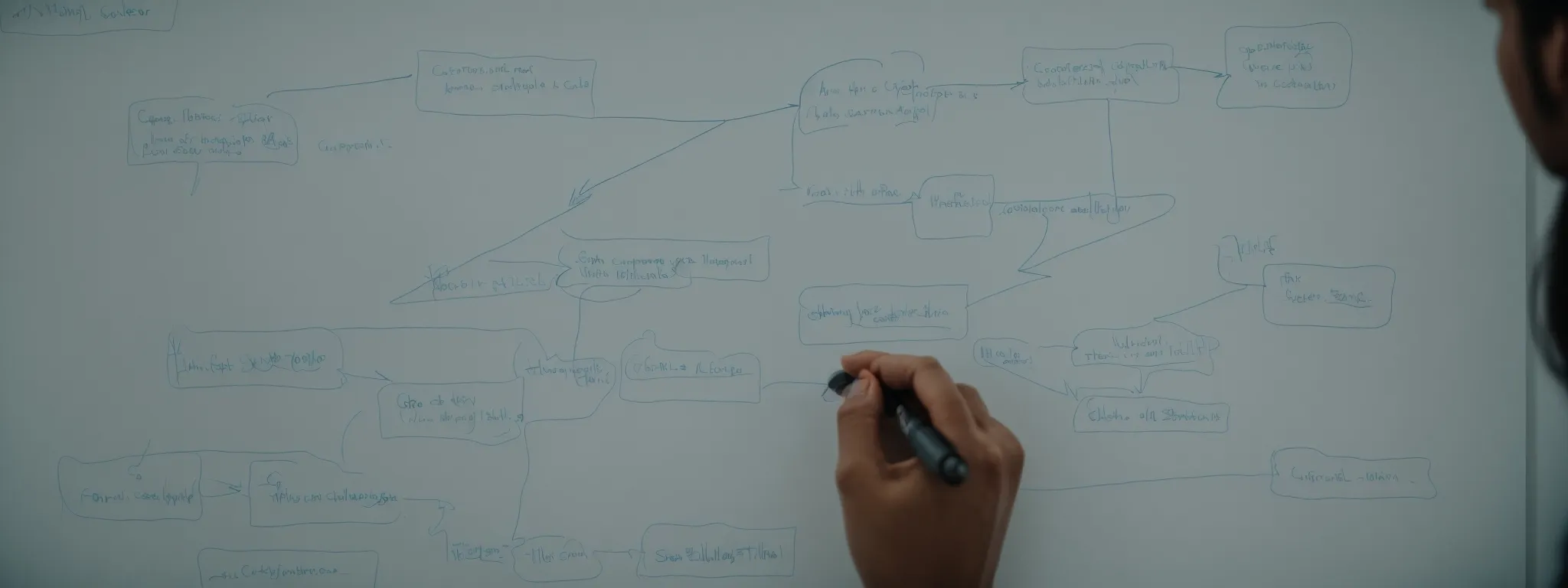Avoiding SEO Keyword Cannibalization: Best Practices
Preventing Keyword Cannibalization in SEO: Effective Strategies Keyword cannibalization occurs when a website’s content overlaps in search queries owing to similar or identical keywords across multiple pages, […]
Preventing Keyword Cannibalization in SEO: Effective Strategies
Keyword cannibalization occurs when a website’s content overlaps in search queries owing to similar or identical keywords across multiple pages, which can dilute a site’s search engine effectiveness.
By spreading potential traffic too thin, this issue not only hampers a page’s ability to stand out but also inadvertently pits pages against each other in the search ranks.
To safeguard against this, one must deploy savvy SEO strategies that not only recognize the signs of cannibalization but also prevent and resolve them effectively.
With focus on LinkGraph’s expertise in SEO audit and content strategy, this guide illuminates the path to a cannibalization-free website.
Keep reading to unlock advanced tactics for harmonizing your keyword approach and amplifying your search engine dominance.
Key Takeaways
- Keyword Cannibalization Hinders a Site’s Ability to Rank and Must Be Addressed With Precise SEO Strategies
- LinkGraph’s SEO Services and Search Atlas Tool Identify and Resolve Keyword Overlaps to Improve SERP Standings
- Creating a Well-Organized Site Structure With Clear Keyword Focus for Each Page Enhances Overall SEO Performance
- Regular Content Audits and Updates Are Essential to Maintain Relevance and Prevent Keyword Cannibalization
- Canonical Tags and Keyword Mapping Are Vital Tactics Used by LinkGraph to Clarify Content Focus and Avoid Competition
Understanding the Basics of Keyword Cannibalization

Within the intricate dance of Search Engine Optimization, a misstep often overlooked is keyword cannibalization, a phenomenon that can dilute a website’s search efficacy.
At its core, this occurs when multiple pages on a site target the same keyword, inadvertently making them competitors in the eyes of search engines.
The implications run deeper than mere internal rivalry; this perplexing issue can seriously impede a site’s ability to secure a coveted spot in search rankings.
This introduction lays the groundwork for understanding keyword cannibalization, unraveling its complexities, and grasping its potential to disrupt a meticulously crafted SEO strategy.
Define Keyword Cannibalization in SEO Terms
Keyword cannibalization in SEO is not about a literal feast, but rather a scenario where a single website’s pages consume the potential of each other to rank. This happens when different pages of a site vie for the same search query, targeting identical or very similar keywords, causing confusion for search engines as they determine which page to prioritize in the Search Engine Results Pages (SERPs).
Recognizing its significance, SEO professionals employ robust analysis to identify keyword overlap that could undercut page rank. Misalignment within a website’s Content Strategy might lead to this predicament, thereby necessitating immediate attention to harmonize the site structure around clear, distinct focus keywords for each page or category.
| SEO Challenge | Keyword Cannibalization Impact |
|---|---|
| Page Authority Dilution | Search engines may struggle to identify the most relevant page, reducing the visibility of the main target page. |
| CTR and Conversions | Splitting traffic across multiple pages can lead to lower click-through rates and reduced conversion potential. |
| SEO Resource Waste | Investment in SEO efforts becomes less effective as pages cannibalize each other’s potential to rank. |
Explore Why It’s Problematic for Your Site
When pages competing for the same keyword reside under one digital roof, the site’s authority on a subject matter is fragmented. This division weakens the host’s power to claim supremacy in search engine rankings, making keyword cannibalization a perilous obstacle on the path to SEO success:
- Audience division leads to weakened page authority, as traffic is not directed to a singular, optimized landing page.
- Search engine confusion ensues, resulting in compromised visibility and a dilution of the user experience.
- SEO investment is siphoned into multiple channels, reducing overall campaign effectiveness.
The ramifications of keyword cannibalization extend beyond diminished SERP presence; they carve into the heart of a company’s digital marketing potential. A unified, keyword-distinct approach maximizes each page’s capacity to attract visitors, engage with the target audience, and ultimately propel conversions – objectives that become difficult to achieve when keyword overlap pervades a site’s content strategy.
Recognize the Impact on Search Rankings
Central to the realm of Search Engine Optimization, a website’s ranking on search engine results pages becomes jeopardized when keyword cannibalization creeps into the equation. Through a kaleidoscope of similar keywords spread across multiple pages, search engines like Google are left puzzled, evaluating which specific page truly deserves the spotlight for a given search query.
LinkGraph‘s sophisticated SEO services, bolstered by the prowess of their Search Atlas SEO tool, adeptly identify and mitigate the effects of this convoluted conundrum. Each page’s unique content and thematic relevance are finely tuned, ensuring that no unintended overlap thwarts the individual strength of a page to ascend in search rankings.
Identifying Signs of Keyword Cannibalization

Unraveling the mystery behind slipping search ranks often leads webmasters to discover keyword cannibalization hidden within their digital tapestry.
Identifying this predicament requires a diligent approach, beginning with a comprehensive audit that sifts through the web content to pinpoint overlapping keywords.
Scrutinizing data from Search Console provides further insight, unveiling patterns that suggest the presence of competing pages.
Observing search results, discerning SEO professionals can swiftly spot conflicting pages.
LinkGraph’s expertise in SEO services, specifically their meticulous SEO audit, positions them as an authority in rectifying such issues, fortifying a website’s content strategy against internal competition and securing its rightful prominence in SERPs.
Audit Your Content for Overlapping Keywords
Launching a comprehensive audit is the cornerstone of detecting keyword cannibalization, an effort that needs particular attention to the nuances of web content and keyword deployment. The professionals at LinkGraph utilize their SEO services to scan each landing page and blog post meticulously, ensuring that each piece of content is aligned to a unique, strategized keyword that enhances visibility rather than detracts from it.
Through the application of tools such as the Search Atlas SEO platform, LinkGraph delivers precision in Backlink Analysis and keyword suggestions, streamlining a website’s content consolidation process. This level of scrutiny allows for the distinct tailoring of on-page SEO efforts, cleverly orchestrating an ecosystem where every page is optimized to target specific, non-competing keywords that elevate its stand in search engine results pages.
Analyze Search Console Data for Clues
An astute analysis of Search Console data often serves as the first line of defense against the risks of keyword cannibalization. LinkGraph’s SEO services shine in their ability to harness this data, offering clients a clear view into how their pages are performing and interacting within the search landscape.
By sifting through queries and performance metrics, LinkGraph’s experts can detect nuances that signal potential keyword conflicts, which might otherwise be latent beneath routine SEO scrutiny. Such targeted examination ensures that each page’s content is meticulously crafted to stand distinct, amplifying its relevance and SERP dominance.
Spotting Conflicting Pages in SERPs
Avid scrutiny of SERPs can unveil the puzzle pieces of keyword cannibalization. Marketers at LinkGraph, through their White Label SEO services, employ a vigilant eye, comparing search results to identify when multiple pages from the same domain rank for identical search queries: a telltale sign of conflicting pages that can hold back search ranks.
| Issue Detected | LinkGraph’s Strategy |
|---|---|
| SERP Position Conflict | Employ advanced tools to analyze ranking data and refine on-page SEO tactics. |
| Diluted Page Authority | Adjust content strategy to ensure clear targeting and distinction between pages. |
Professional vigilance in identifying these conflicts paves the way for targeted interventions. LinkGraph tailors a course of action using the comprehensive capabilities of Search Atlas, focusing on achieving optimal page relevance and authority to ensure a dominant, cannibalization-free presence in search engine results pages.
Strategies to Prevent Keyword Cannibalization

To shield a website from the adverse effects of keyword cannibalization, adopting a proactive stance is essential.
Shrewdly conducting thorough keyword research lays the foundation for a robust and cannibalization-resistant SEO framework.
This, coupled with a well-organized content hierarchy, creates a crystal-clear blueprint that delineates the unique role and relevance of each page within the site.
Equally pivotal is the implementation of a strategic internal linking plan, which not only guides users through the site’s informational depth but also solidifies the authority and improves the search engine ranking of key pages.
Tackling these strategies with precision and foresight can transform the SEO landscape for a site, ensuring that every page contributes to the overarching goal of enhanced online visibility and user engagement.
Conduct Thorough Keyword Research
Thorough keyword research stands at the core of averting keyword cannibalization, providing the scaffolding for a strategically robust SEO framework. LinkGraph leverages advanced analytics and their Search Atlas tool to generate comprehensive keyword suggestions that align with user intent and sidestep redundancy across webpages.
This process entails diving into the behavioral trends of the target audience, discerning the granular details of their search queries and how they relate to the respective products or services. It’s this exacting approach to keyword strategy that cultivates a diverse yet coherent content ecosystem, ensuring robust search engine presence:
| Keyword Research Step | LinkGraph’s Approach |
|---|---|
| Identifying Target Keywords | In depth analysis of audience search habits to establish precise target keywords. |
| Evaluating Keyword Competitiveness | Utilizing Search Atlas for strategic insight into keyword difficulty and SERP features. |
Organize Your Content With a Clear Hierarchy
A meticulous site structure with a clear hierarchy is vital for warding off keyword cannibalization. LinkGraph excels in formulating site architectures where each landing page, product page, and category page is organized with careful consideration to the flow of content, setting distinct boundaries for target keywords and solidifying the authority of main topic pages.
Within this structured framework, LinkGraph’s On-Page SEO Services play a critical role in establishing a logical content hierarchy that guides search engines and users alike. The agency ensures that anchor text is used effectively, internal links are strategically placed, and content is curated to align cohesively with determined site hierarchy, all key elements in maintaining distinct keyword relevance across a client’s domain.
Utilize a Strategic Internal Linking Plan
An astutely formulated internal linking plan serves as both a compass for user navigation and a framework for reinforcing SEO efforts. By strategically embedding anchor texts that guide users to pertinent, high-value pages, a site enriches its authoritative standing on key topics in the eyes of search engines.
Applying a cohesive internal linking strategy ensures clarity in content relevance, preventing pages from competing against one another for user and search engine attention. The plan furthers the understanding of page hierarchies, indicating to search engines which pages should rank prominently for specific keywords:
- Carefully designate primary pages for major keywords to fortify their search engine ranking positions.
- Link supportive content to these primary pages using deliberate, relevant anchor text to maintain topical authority and enhance user experience.
- Utilize noindex tags judiciously for pages not intended for SERP competition, securing focused traffic to strategic pages.
SEO Techniques to Resolve Existing Cannibalization

When confronted with the complex challenge of keyword cannibalization, it becomes imperative to deploy a series of corrective SEO techniques designed to resolve existing content conflicts.
Tackling this issue head-on, professionals at LinkGraph utilize a multifaceted approach that includes the consolidation of competing content, the strategic implementation of 301 redirects, and the meticulous adjustment of on-page SEO elements.
These prudent measures are integral in realigning the focus of individual pages, thereby sculpting a site’s content to resonate clearly with target search queries and enhancing overall search engine visibility.
Merge Content From Competing Pages
Merging content from competing pages serves as a pivotal step towards resolving the ravages of keyword cannibalization. LinkGraph’s expert team meticulously folds similar content into a single authoritative resource, effectively reducing redundancy and concentrating the SEO strength of the site’s offerings around targeted search queries.
Through strategic content consolidation, LinkGraph ensures that search engines can effortlessly discern the most relevant page for a particular keyword, bolstering its position in the search rankings. This approach not only tidies up the site structure but also enhances the user experience by streamlining the discovery of information.
Implement 301 Redirects Where Necessary
The strategic utilization of 301 redirects is a critical component in remedying instances of keyword cannibalization. LinkGraph’s professionals apply this technique when consolidating content that competes for the same keywords, rerouting users and search engines from the eliminated page to the most relevant, remaining resource.
By judiciously implementing 301 redirects, LinkGraph ensures a seamless transition for both users and search engine crawlers, maintaining the site’s integrity and link equity. These redirects effectively merge the SEO value of multiple pages into a single, authoritative destination, bolstering its significance in the eyes of the search engine:
- Identify duplicate or similar content targeting the same keywords
- Choose the most relevant page to serve as the primary resource
- Apply 301 redirects from less authoritative pages to the chosen page
- Confirm the preservation of link equity post-redirection
Adjust on-Page Elements for Distinct Focus
Adjusting on-page elements demands precision, where each title, meta description, and headers are fine-tuned to undeniably represent distinct topics and keywords. LinkGraph’s On-Page SEO Services specialize in distinguishing a client’s page content by adjusting these critical on-page elements, thus averting the risk of keyword cannibalization and sharpening the focus for search engines and users alike.
Ensuring that each web page clearly communicates its unique value proposition through dedicated keywords and related phrases, LinkGraph crafts on-page content that speaks effectively to the client’s target audience. Such meticulous refinement prevents internal competition and solidifies a website’s thematic relevance, serving to elevate the site’s standing in the digital market and improve search engine rankings.
Using Canonical Tags to Combat Cannibalization

In the nuanced landscape of Search Engine Optimization, the adept use of canonical tags emerges as a vital strategy for preempting keyword cannibalization.
These HTML elements serve as signposts for search engines, authoritatively guiding them towards the pages intended as the primary sources for specific content.
The forthcoming discussion will elucidate the nuanced function of canonical tags, reveal the intricacies of their proper implementation, and elucidate how to sidestep the prevalent pitfalls associated with their use.
Grasping these elements ensures that a site’s thematic integrity remains intact, bolstering its stature amid the competitive arena of search rankings.
Understand the Role of Canonical Tags
In the battle against keyword cannibalization, canonical tags are essential tools for webmasters. By signaling the preferred version of a web page when similar pages exist, these tags inform search engines which URL should be the authoritative source for a particular focus keyword.
LinkGraph’s technical SEO expertise includes the strategic implementation of canonical tags to maintain a site’s clarity in content and search engine optimization efforts. Properly using these tags prevents dilution of page rank and consolidates search authority, ensuring that the designated page receives due recognition and traffic for its targeted search queries.
Proper Implementation of Canonicalization
The act of canonicalization through the insertion of canonical tags requires a deliberate approach to SEO, ensuring that the selected page is rightfully acclaimed by search engines as the principal node for the associated keyword. LinkGraph’s adept digital marketing team specializes in the proper execution of these elements, harnessing Search Atlas to prevent search engines from splintering rankings across duplicate or closely related content.
Through the meticulous application of canonical tags, LinkGraph safeguards their clients’ websites against the detrimental effects of keyword cannibalization, clarifying the primary source of content. This practice is instrumental in solidifying the relevancy and authority of the chosen page, thus streamlining the path for higher search visibility within the competitive digital landscape.
Avoid Common Mistakes With Canonical Tags
Addressing keyword cannibalization with canonical tags is a nuanced task, and errors in this process can further complicate search engine understanding. Firms like LinkGraph circumnavigate these common pitfalls by ensuring that canonical tags point to the most relevant, content-rich page, thus reinforcing its authority without causing confusion amongst similar pages that could lead to misdirected search results.
One critical oversight often encountered is the incorrect or indiscriminate application of these tags across a site’s pages. The team at LinkGraph demonstrates meticulous attention to detail, applying canonical tags selectively to prevent self-imposed canonicalization issues that could inadvertently result in search engines disregarding important content or, in worst cases, penalizing a site’s search standings.
Creating a Roadmap for Content Optimization

Developing a strategic approach to content creation and optimization is paramount in the battle against keyword cannibalization.
A meticulously crafted content calendar that harmonizes with SEO objectives acts as the linchpin for a disciplined, forward-thinking marketing strategy.
By prioritizing topic clusters, LinkGraph fosters a focused and coherent content environment that averts the potential perils of keyword overlap.
It is with regular auditing and refinement of existing content that webmasters sustain relevancy, ensuring every blog post, landing page, and category page remains abreast with evolving SEO benchmarks and audience expectations.
Develop a Content Calendar Aligned With SEO Goals
Establishing a content calendar that aligns with SEO goals is a foundational step for modern webmasters. Such a calendar ensures that the production and publishing of web content are orchestrated around strategic SEO benchmarks, effectively safeguarding against keyword overlap.
This deliberate planning tool serves as a roadmap, guiding content creation with precision to bolster search engine rankings and enhance user engagement:
| SEO Priority | Calendar Objective | Resulting Benefit |
|---|---|---|
| Keyword Distribution | Schedule diverse topics to avoid redundancy | Minimizes risk of keyword cannibalization |
| Content Freshness | Regular updates and audits | Reinforces content relevancy and authority |
| Strategic Publishing | Timing releases to coincide with peak user activity | Optimizes user engagement and potential for sharing |
By mapping out a cohesive content strategy in concert with SEO imperatives, LinkGraph facilitates consistent delivery of quality content that resonates with target audiences while steering clear of detrimental keyword practices.
Prioritize Topic Clusters to Maintain Focus
Central to dispelling the specter of keyword cannibalization is the strategic deployment of topic clusters. LinkGraph champions this approach by concentrating related pieces of content around central ‘pillar’ themes, ensuring that each serves a specific facet of a user’s search intent while collectively enhancing the domain’s authority on the broader subject.
The disciplined focus on topic clusters eliminates confusion for search engines and users: each cluster orbits a unique content pillar, supporting the integrity of keyword targeting and site structure. This facilitates a clear path for users seeking information, simultaneously fostering content depth and thematic clarity:
| SEO Objective | Topic Cluster Benefit |
|---|---|
| Keyword Focus | Avoids overlap by assigning specific keywords to defined clusters. |
| Authority Building | Strengthens domain expertise and credibility in a subject area. |
Through LinkGraph’s meticulous orchestration of topic clusters, each piece of content enriches the relevance of its primary subject, creating a synergistic effect that propels the site’s standing in both the eyes of its audience and the algorithms that govern search rankings.
Regularly Review and Update Existing Content
To sustain a high-performing SEO strategy, LinkGraph encourages a process of continual content assessment and renewal. The agency recognizes that search engine algorithms and audience interests evolve, necessitating the regular review and update of existing content to prevent keyword overlap, maintain relevancy, and enhance user engagement.
LinkGraph’s dedicated team systematically revisits client content to refine and optimize web pages, ensuring that each piece of content is exclusive in its focus and contributes positively to the overall domain authority. This vigilance against static content affirms a brand’s commitment to quality and relevance, paramount for long-term SEO success.
Advanced Tools and Resources for Managing Keywords

In the digital marketing domain, rectifying keyword cannibalization is akin to navigating a complex labyrinth, a challenge that calls for an intelligent suite of tools and strategic foresight.
Professionals equipped with robust SEO platforms can delve into the depths of analytics, bringing forth insights pivotal to managing keyword strategies effectively.
The efficacy of a campaign is markedly enhanced by the judicious deployment of keyword mapping, which fortifies content organization, and by the vigilant monitoring of keyword performance to maintain SEO momentum.
Organizations that leverage these advanced resources gain the clarity needed to optimize keyword usage continuously, mitigating the risks of keyword cannibalization and fortifying their search engine positioning.
Leverage SEO Platforms for Deeper Insights
LinkGraph’s expertise extends into the utilization of sophisticated SEO platforms to uncover deeper insights into keyword performance and management. The data gleaned from these platforms allows for a closer examination of user search behaviors and the competitive landscape, driving informed adjustments to a comprehensive SEO strategy.
Arming clients with such intelligence, the Search Atlas tool, for instance, becomes an indispensable asset for ongoing content optimization. These deep insights enable the proactive tweaking of keyword approaches, reducing the likelihood of unintentional keyword overlap and enhancing a page’s ability to rank effectively within search engine results pages.
- Comprehensive analysis of user search patterns with cutting-edge tools refines keyword strategies.
- Pinpointing opportunities for content optimization and differentiation to prevent keyword cannibalization.
- Monitoring competitive keyword usage to stay ahead in search engine rankings.
Utilize Keyword Mapping for Better Organization
Keyword mapping is an indispensable technique employed by LinkGraph to masterfully organize and allocate keywords across a client’s web content. This method ensures that every piece of content has a clearly defined primary keyword, thereby eliminating the risk of multiple pages vying for the same term and negating instances of keyword cannibalization.
With the strategic application of keyword mapping, LinkGraph solidifies the thematic structure of a website, ensuring each page serves a unique purpose in the overall content narrative. This disciplined approach not only streamlines SEO efforts but also enhances the site’s navigability, directly benefiting user experience and reinforcing the coherence of content strategies.
Continuously Monitor Keyword Performance
LinkGraph exemplifies the significance of persistent keyword performance monitoring as part of a rigorous SEO strategy. This tireless oversight allows the agency’s experts to identify shifts in search trends and user behavior, enabling rapid response and adaptations to a website’s keyword strategy to maintain search relevance and combat keyword cannibalization.
Through vigilant performance tracking, LinkGraph ensures that no page falls prey to keyword overlap. The professionals at LinkGraph stand guard, consistently analyzing search ranks and user engagement metrics to pinpoint and resolve any hints of content competing against itself, thereby reinforcing a website’s authority and position within search engine results pages.
Frequently Asked Questions
What is keyword cannibalization and how does it affect SEO rankings?
Keyword cannibalization occurs when a website has multiple pages competing for the same or similar keywords, which can dilute the site’s ability to rank effectively for that term. This internal competition can confuse search engines as to which page is most relevant for the target keyword, thereby potentially harming the site’s overall SEO performance and reducing the efficacy of the content on those pages.
How can I identify if my website is experiencing keyword cannibalization?
Identifying keyword cannibalization involves analyzing if multiple pages on your website are targeting the same keyword, which can be detrimental to your SEO efforts as it confuses search engines on which page to prioritize. A thorough SEO audit using a tool like LinkGraph’s Search Atlas can pinpoint instances of overlapping focus keywords that may lead to self-competition and impede your site’s search engine ranking.
What are some effective strategies to prevent keyword cannibalization?
Effective strategies for preventing keyword cannibalization include a thorough SEO audit to map out all keywords against their specific landing pages, thus ensuring that each target keyword is distinct and purposeful. Another crucial approach is the strategic consolidation of content, where similar or competing pages are merged or refined to strengthen a single page’s search engine ranking, focusing on user experience and search intent to meet the reader’s needs more directly.
Are there any SEO techniques to resolve existing instances of keyword cannibalization?
Resolving keyword cannibalization often involves a thorough SEO audit to identify overlapping keywords across pages, followed by strategic content consolidation or the optimization of on-page SEO elements to ensure each page targets a unique, relevant focus keyword. Furthermore, utilizing robust tools such as LinkGraph’s Search Atlas can streamline the process of backlink analysis, providing insights to distinguish and fortify the prominence of each individual page within search engine rankings.
How can canonical tags be used to combat keyword cannibalization?
Canonical tags serve as a signal to search engines, guiding them to the preferred version of a web page when similar content exists; this practice effectively resolves issues of keyword cannibalization by consolidating search rank signals. By employing this method, webmasters can ensure that their target keyword’s user search intent aligns optimally with a singular, authoritative page, thus averting the dilution of keyword efficacy across multiple pages.
Conclusion
Preventing keyword cannibalization is vital to maintaining a strong SEO strategy.
It requires a structured approach, including thorough keyword research, organized content hierarchies, and strategic internal linking.
Using tools like LinkGraph’s Search Atlas, SEO professionals can detect cannibalization and make informed adjustments.
Techniques such as merging similar content, implementing 301 redirects, and adjusting on-page elements help resolve existing issues.
Canonical tags and a clear content calendar aligned with SEO goals mitigate future risks.
Prioritizing topic clusters ensures focused content, while regular reviews keep content relevant.
Advanced tools provide deep insights and help maintain keyword organization.
Continually monitoring keyword performance is essential to combat cannibalization and maintain a solid presence in SERPs.
Implementing these effective strategies will prevent internal competition among pages, ensuring each one contributes positively to the site’s overall visibility and authority in search rankings.















































































